case studies
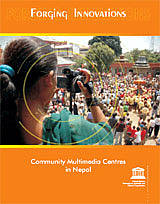 [2007] This collection of case studies intends to showcase the diverse growth of three Community Multimedia Centres (CMCs) supported by Unesco in Nepal since 2003, in an effort to understand their social impact.
[2007] This collection of case studies intends to showcase the diverse growth of three Community Multimedia Centres (CMCs) supported by Unesco in Nepal since 2003, in an effort to understand their social impact. The case studies show how local communities accessed and utilised newly available ICT tools in different ways. The authors carried out field visits to interview managers, staff, local researchers, community reporters, volunteers and community people. This allowed to identify some key issues which can assist in providing ICT access to poor and marginalised communities in Nepal.
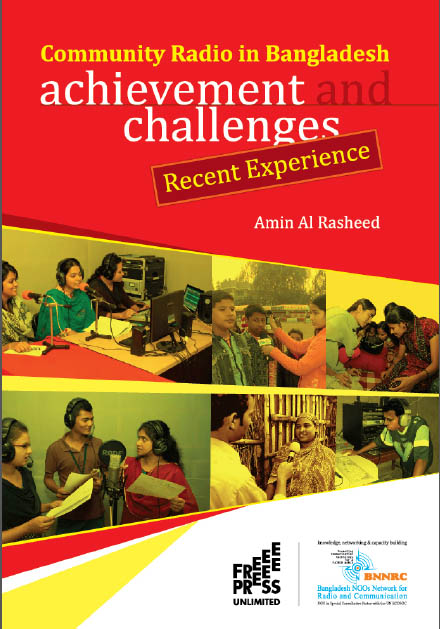 [2012] This publications collects the experience of 14 community radio stations currently on air in Bangladesh. It maps the achievements and challenges faced by these radio stations since their launch. Among the main challenges are generating financial resources and ensuring community partnership and spontaneous people's participation.
[2012] This publications collects the experience of 14 community radio stations currently on air in Bangladesh. It maps the achievements and challenges faced by these radio stations since their launch. Among the main challenges are generating financial resources and ensuring community partnership and spontaneous people's participation.This book, published by the Bangladesh NGOs Network for Radio and Communication (BNNRC), is useful for the community media activist, policy makers, academia and development partners working to achieve a free, independent and pluralistic community media sector for the voiceless in rural Bangladesh.
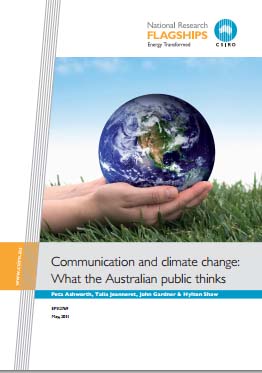 [2011] This report provides details of the outcome of an internet survey conducted in October 2010 that was aimed at understanding the current attitudes, beliefs, perceptions and knowledge of the Australian general public about climate change issues, their responses to climate change, and their preferred methods of communication about these issues.
[2011] This report provides details of the outcome of an internet survey conducted in October 2010 that was aimed at understanding the current attitudes, beliefs, perceptions and knowledge of the Australian general public about climate change issues, their responses to climate change, and their preferred methods of communication about these issues.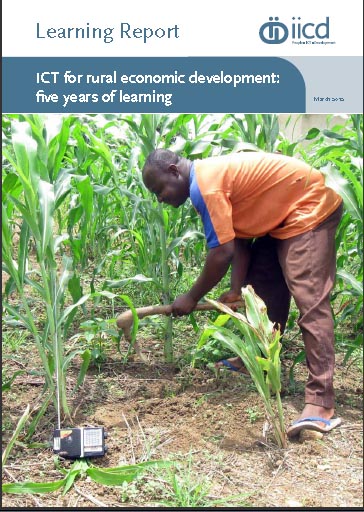 [2012] Rural economic development has been a priority within IICD’s strategy since IICD was first established 15 years ago. During the past five years, 35 projects have been supported in nine countries as part of IICD’s overarching programme to promote socio-economic development through increased ICT access and use. This publication gives an overview of the lessons learned and examples of IICD's work in ICT for rural economic development.
[2012] Rural economic development has been a priority within IICD’s strategy since IICD was first established 15 years ago. During the past five years, 35 projects have been supported in nine countries as part of IICD’s overarching programme to promote socio-economic development through increased ICT access and use. This publication gives an overview of the lessons learned and examples of IICD's work in ICT for rural economic development.Individuals, families, communities, organisations and sectors can all benefit from accessing relevant information and communication tools. The experiences of partners demonstrate that the multiplicity of effects and lessons can be better grasped when they are looked at from the individual, organisational and sector level.
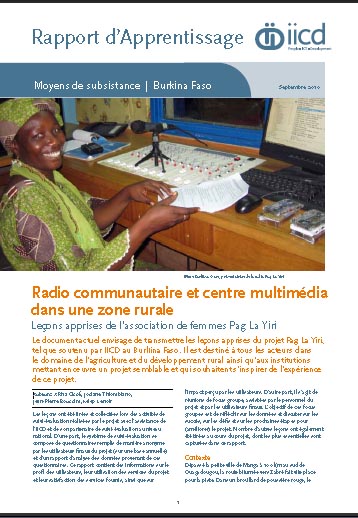 [2010] The document intends to pass on the lessons learned from the project Pag The Yiri, supported by IICD in Burkina Faso. It is intended for all stakeholders in the field of agriculture as well as rural development institutions implementing similar activities who want to learn from the experience of this project.
[2010] The document intends to pass on the lessons learned from the project Pag The Yiri, supported by IICD in Burkina Faso. It is intended for all stakeholders in the field of agriculture as well as rural development institutions implementing similar activities who want to learn from the experience of this project.This report is only available in French.
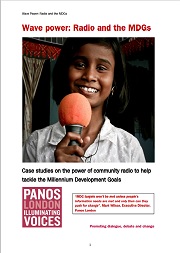 [2010] This paper by PANOS London showcases four community radio projects helping to tackle the Millennium Development Goals in developing countries.
[2010] This paper by PANOS London showcases four community radio projects helping to tackle the Millennium Development Goals in developing countries.The case studies - in India, Malawi, the Caribbean and Nepal - demonstrate how communication at the grassroots level is so important, not only empowering the people most affected, but enabling them to become advocates for change in their own communities.
See in particular case 2 on Mwana Alirenji, a farmer-to-farmer radio magazine addressing food security in rural Malawi, and case 3 on My Island-My Community, the first soap opera to address climate change in the Caribbean.
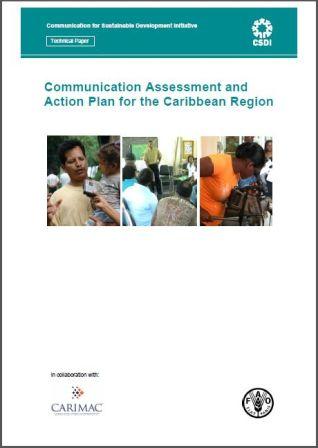 [2012] This paper is the result of an evaluation carried out in 2009 to review the needs and priorities in communication for natural resources management and climate change adaptation in agriculture for the Caribbean. The study guided the development of an action plan forCommunication for Sustainable Development Initiative (CSDI) implementation within the region. Most Caribbean economies depend largely on agriculture, fisheries, and tourism which are all industries inextricably affected by climate change.
[2012] This paper is the result of an evaluation carried out in 2009 to review the needs and priorities in communication for natural resources management and climate change adaptation in agriculture for the Caribbean. The study guided the development of an action plan forCommunication for Sustainable Development Initiative (CSDI) implementation within the region. Most Caribbean economies depend largely on agriculture, fisheries, and tourism which are all industries inextricably affected by climate change.CSDI communication assessment specifically aimed to highlight existing capacities, resources and key actors working on communication, climate adaptation and disaster risk management in the Caribbean. Based on this, the project designed its regional strategy and identified potential partners and activities to support sound environmental practices and enable rural communities to better cope with, and adjust to, the realities of climate change.
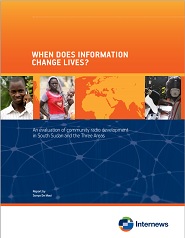 [2012] This paper examines the question, “Does information change lives?” by looking at the role of five small FM radio stations, launched and managed by Internews, operating in a vast territory that includes what is now South Sudan and the regions known as the Three Areas. The stations were established during the Comprehensive Peace Agreement (CPA) that ended Africa’s longest-running civil war in 2005 and led to the establishment of South Sudan as an independent state in July 2011.
[2012] This paper examines the question, “Does information change lives?” by looking at the role of five small FM radio stations, launched and managed by Internews, operating in a vast territory that includes what is now South Sudan and the regions known as the Three Areas. The stations were established during the Comprehensive Peace Agreement (CPA) that ended Africa’s longest-running civil war in 2005 and led to the establishment of South Sudan as an independent state in July 2011. The study concludes that there is enormous potential for media development in South Sudan because of the enthusiasm for and interest in news and information, even in the most remote villages. Local radio is a platform for political and cultural expression and a site for citizen participation, empowerment, and social and political change. Radio is also relatively inexpensive to operate, to program and, for audiences, to receive.
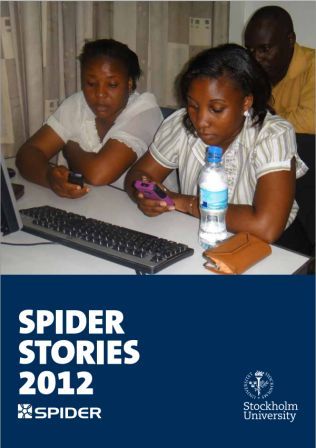 [2013] This publication gives an overview of results from ICT4D projects initiated in 2011-2012 by the Swedish Program for ICT in Developing Regions (Spider) in Cambodia, Kenya, Rwanda, Tanzania and Uganda.
[2013] This publication gives an overview of results from ICT4D projects initiated in 2011-2012 by the Swedish Program for ICT in Developing Regions (Spider) in Cambodia, Kenya, Rwanda, Tanzania and Uganda.In partnership with local organizations, Spider supported ICT4D projects in democracy, education and health, and crosscutting themes such as Free and Open Source Software, mobiles for development (M4D), cultural creativity and youth empowerment.
The projects made creative uses of drama and music along with digital cameras, video and mobile phones to engage in dialogue and empower local communities. The storytelling format captures the voices of project partners as well as the ultimate beneficiaries of their ICT4D efforts: ordinary people in different social settings.
 [2011] This report captures practical case studies and best practice in communication with affected communities during the humanitarian response in Haiti. The 7.0 magnitude earthquake was unfortunately not the only emergency to strike Haiti in 2010, as the outbreak of cholera brought a new, highly infectious and deadly disease to a country with weak sanitation and health systems. The response of communication actors was essential to the survival of potentially thousands of people, whose ability to recognise symptoms and take prompt action was literally the difference between life and death.
[2011] This report captures practical case studies and best practice in communication with affected communities during the humanitarian response in Haiti. The 7.0 magnitude earthquake was unfortunately not the only emergency to strike Haiti in 2010, as the outbreak of cholera brought a new, highly infectious and deadly disease to a country with weak sanitation and health systems. The response of communication actors was essential to the survival of potentially thousands of people, whose ability to recognise symptoms and take prompt action was literally the difference between life and death.This document was published by infoasaid, a DFID-funded project implemented in partnership by Internews and the BBC World Service Trust. The overall project goal was to improve the quality of humanitarian responses by maximising the amount of accurate and timely information available to both humanitarian responders and affected populations through enhanced information exchange between them.
Powered by Phoca Download




